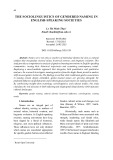









English as a foreign language (EFL) learners face various speaking challenges. Prior research has demonstrated that inadequate instructional methods and students' lack of motivation are the primary factors contributing to their low speaking competency. The use of scaffolding has received acclaim for its capacity to effectively engage a wide range of learners.

Language abilities that complement one another include speaking and listening. This study used the team games-based language learning (TG-BLL) paradigm to assist students in developing their speaking and listening skills. English professionals verified the quality of the learning materials used in the design of this model, which included exercises and relevant learning resources.

This research explores the difficulties encountered by non-English major students while getting ready for the VSTEP speaking test at a university in Vietnam. A total of fifty-two intermediate-level students, comprising 12 juniors and 40 seniors, took part in a survey evaluating their views on the test, challenges in preparation, and obstacles to performance.

This study investigated the application of artificial intelligence tools in enhancing the speaking skills of non-English major students at a university in Hanoi - Hanoi University of Civil Engineering. The study employed a mixed-methods approach, including experiments, surveys, and interviews to evaluate the impact of AI tools such as speech recognition and feedback systems.








